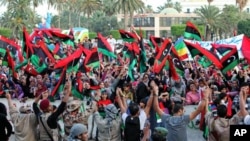As Libya’s interim government takes form, there are concerns in the West that Libya will become a stricter Islamic society. Our reporter finds that many people in Tripoli want a modern democracy, with Islam serving only as a religious and cultural foundation.
In the days after Libya declared itself liberated, people were caught up in the euphoria of the moment. The bazaar in Tripoli’s old city was crowded, and people were enthusiastic about the future.
Among them was Mohammed al-Jadi, an engineering consultant who studied in the United States.
“I’m so optimistic, and I think we are going to get onto the track and it will be a democratic country,” said al-Jadi.
Other shoppers shared the same excitement.
“We never expected these kind of days here. We’ve been under pressure for all our life, actually. But we feel the freedom finally. And I taste the freedom, how it tastes, and I enjoy it these days,” said one woman.
“I’m really happy about the New Libya. We were living in a box and then came this revolution led by the young people that liberated us. May God have mercy on the martyrs,” said a man who was interviewed.
But the Liberation Day speech by Mustafa Abdul Jalil, who led the National Transitional Council, caused concern in the West that the new Libya might adopt a strict interpretation of Islamic law, limiting the rights of women and turning away from modernism.
The speech also caused concern among some Libyans, including Fathi Bin Isa, editor of one of the country’s new newspapers, The Mermaid.
“The revolution isn’t over until it achieves its objectives. The goal of the revolution is to build a democratic, civil state. The first step is to hold a referendum on what the nature of the state should be,” said Bin Isa.
Bin Isa believes Libyans will choose democracy and moderation, but he said they must be given the chance to vote on the issue.
At Tripoli’s central mosque for the first Friday midday prayers after the revolution, several worshippers indicated that they agree.
“I can see that parties are starting to organize and it looks like most of the Libyans are willing to have a democratic country. It will be a moderate Islamic country, that’s what I think about it,” said one man.
“We fought all the way to get to this point in time and we will continue to fight in different ways, politically to make sure that we gain our freedom and we maintain it,” said another man who was there for prayer.
Several people said Libya is clearly an Islamic country, but many also used words like "liberal" and "moderate" to describe it. And they said the years of dictatorship made them eager to gain and exercise their personal freedoms and democratic rights.




